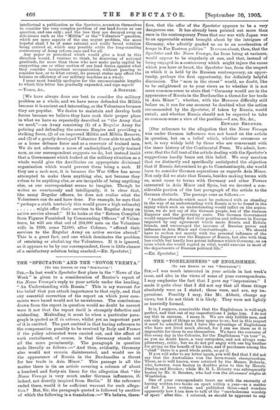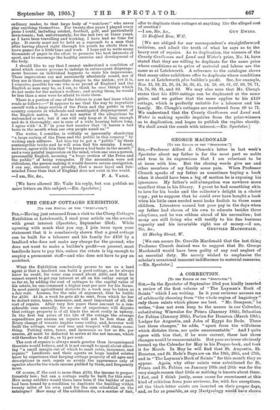ITO THE EDITOR OF TICE " SPECTATOR."'
was much interested in your article in last week's issue, and also in the views of some of your correspondents. I may emphasise the fact that I gave my " impressions." I made it quite clear that I did not say that all these things absolutely were as I stated ; those were, and are, my im- pressions. Possibly I may, like Mr. Abbott, change my views, but I do not think it is likely. They were not lightly or hurriedly formed.
It is, I suppose, conceivable that the Englishman is well-nigh perfect, and that out of my imperfections I judge him. I do not say this in sarcasm. I mean it. We are only fallible men, and can only speak of things as they appear to us ; but in this respect it must be admitted that I have the advantage of Englishmen who have not lived much abroad, for I can see them as it is impossible for them to see themselves. We have the converse of this every day in the Colonies, for the Englishman "on tour" is, as you no doubt know, a very outspoken, and not always com,. plimentary, critic; but we do not get angry with our big brother for giving us the benefit of his ideas, and if perchance among the "chaff " there is a good whole grain, we get it. If you will refer to my letter again, you will find that I did not say that the Australians won the lawn-tennis championships. Those, as is well known, were retained by the Messrs. Doherty, who, however, were beaten in doubles prior to this by Messrs. Dunlop and Brookes; while Mr. H. L. Doherty was subsequently beaten by Mr. G. Brookes, who had won the all-comers' singles at Wimbledon.
One of your correspondents taxes me with the enormity of having written two books on sport within a year—as a matter of fact I have written and published three—and wonders apparently how I can dare to talk of the "unwholesome worship of sport " after this. I referred, as should be apparent to any
ordinary reader, to that large body of " watchers " who never play anything themselves. For twenty-five years I played every game I could, including cricket, football, golf, and particularly lawn-tennis ; but, unfortunately, for the last two or three years, as I have been travelling and working, I have had no time for play. It surely must not be held as a reproach to a man that after having played right through his youth he elects then to leave games for a little time and work. I hope yet to write many thousands of pages in the effort to promote the best interests of sport, and to encourage the healthy exercise and development of the body.
I should like to say that I cannot understand a condition of mind which causes persons to indulge in extravagant disparage- ment because an individual happens to state his impressions. These impressions are not necessarily absolutely sound, nor if they are is there any immediate danger to the nation ; yet it is, I conceive, possible for one who is as proud of England and the English as man may be, as I am, to think he sees things which do not make for the nation's welfare ; and seeing them, he would be less thin a man were he afraid to state them.
There is a portion of one of the letters in your last issue which reads as follows :—" It appears to me that the way to ingratiate oneself with a large section of the Press and the public in this country consists in wholesale and unmitigated disparagement of the English nation. It does not matter if the allegations be unfounded or not; but if one will only keep at it long enough and do it thoroughly, one is sure of a wide hearing before long. I agree with A. F.' in your last number that it leaves a bad taste in the mouth when our own people assail us."
The writer, I consider, is wilfully or ignorantly slandering "a large section of the Press and the public in this country " by writing such silliness. Let him try to get a " public " by these contemptible tricks and he will soon find his mistake. I must, however, agree with him that "it leaves a bad taste in the mouth," and a very painful impression on the mind, when one sees a person, presumably English, accusing "a large section of the Press and the public" of being renegades. If the accusation were not ridiculous, the person making it would deserve severe castigation. I can say, sincerely and proudly, that a more loyal and fair- minded Press than that of England does not exist in the world.
—I am, Sir, &c., P. A. VAILE.











































 Previous page
Previous page